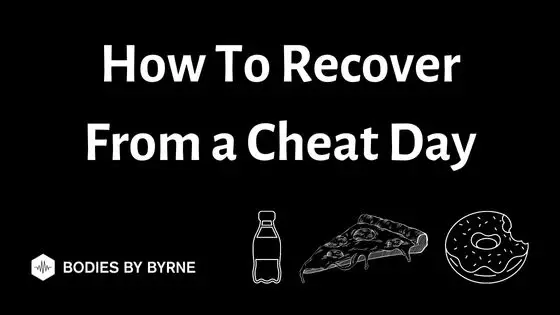We’ve all been there. You’re deep into a dieting phase to lose fat, you’ve been low on energy and craving some unhealthy foods so you have a cheat day.
Cheat days aren’t an issue though.
Most coaches will intentionally program them into a diet in order to kickstart metabolism, replenish muscle glycogen stores to fuel weight training, keep you motivated, and ultimately on track with a plan.
After all, one cheat day is better than completely falling off the fat loss wagon!
The issue is that people do get carried away on cheat days.
This is not only hard to recover from physically (morning after bloating anyone?) but also mentally. The feeling of cheating on your diet is never easy to shake off even if the cheat day was planned and programmed.
Therefore, read on and I’ll explain how to successfully recover from a cheat day so that it doesn’t have a long-lasting impact on your progress.
How To Recover From a Cheat Day
I’m sure most people reading this are already aware of what a cheat day is but just for some clarification, a cheat day is a day when you consume foods that are otherwise not included in your diet plan.
These often include foods that are considered to be “junk” due to low nutrition values and high calories.
They also tend to be treat foods that people crave, especially when you’re following a strict dieting plan throughout the week.
Cheat day foods tend to include the following:
- Takeaway meals
- Desserts
- Fast food
- Pizza
- Soda
- Burgers
- Shakes
- Pasta
- Cereal (high in sugar like frosted flakes)
- A range of other “treats”

^^ Probably not suitable for a cutting phase…
Cheat days will typically result in you consuming a calorie surplus and while you enjoy the food at the time, more often than not you’ll feel regret the next morning as you wonder whether or not the cheat day has ruined your diet and hard work.
Most people will also be looking for the fastest way to recover from a cheat day.
Below, I’ve listed four crucial tips to help you recover from a cheat day.
1. Get Back on Plan (Mentally & Physically)
Once you’ve had a cheat day you need to understand that it’s now in the past.
It’s happened and you now need to move on with your diet/training plan with commitment and most importantly, without guilt.
I’ll cover some tips to help to recover from a cheat day physically but you first need to move on mentally.
The guilt from a cheat day or even the relief of having one is often enough to turn one cheat day into two cheat days and before you know it, you’re no longer even following a diet anymore.
It’s important to know that a cheat day isn’t bad despite the name. Much like going to the gym for a day won’t have any noticeable impact on your physique, the same is true for a cheat day.
One cheat day won’t make or break a diet and it might not even be a setback.
In some cases, cheat days are beneficial.
Therefore, you need to accept that the cheat day is in the past and get straight back onto your plan as though nothing has changed.
To help this, I’d avoid using the scale for 1-3 days.
The calories and carb intake will lead to water retention and this will lead to weight gain from a cheat day.
This is however temporary and isn’t going to be body fat.
Seeing the scale go up a few pounds though can be demoralizing so don’t put yourself through that and just get back on track with your diet and training.
2. Drink Water and Fully Hydrate
Let’s be honest, a cheat day usually involves some foods very high in fats, carbohydrates, and salt.
After a cheat day, it’s not uncommon to wake up and feel hungover – especially after a particularly heavy cheat day.
The main reason for this is dehydration.
For every 1g of carbohydrate that you store as glycogen, you will retain 2g – 3g of water (typically within the muscles).
If you have a high carb cheat day without drinking an equally proportionate amount of water, you’ll pull water from surrounding tissue and this will lead to dehydration.
Combine this with the salt intake and it’s not really surprising that you’ll wake up feeling hungover and dehydrated.
Therefore, a priority should be drinking water and getting rehydrated to start your recovery from a cheat day.
Drinking water will not only help with hydration, but it will also fill your stomach and reduce hunger which is common when blood sugar and glucose levels are messed up following a cheat day.
It will also help flush out the salt and toxins and clear your system as quickly as possible.
Aim for at least 2-3 liters of water the day after a cheat day.
3. Manage Your Calories
To plan a cheat day, I’d recommend managing your calories in the week leading up to a cheat day.
If, however, you’ve had an accidental cheat day, damage limitation will therefore need to be done the following day.
To do this, you’ll need to either have a low-calorie day or consider Fasting after a cheat day.
Let’s take a reasonable number and say that on your cheat day you had a 1,200 calorie surplus.
If you’d planned for that, you could have a 200 calorie deficit each day in the lead into a cheat day to balance out your weekly calorie intake.
Without doing this, you’ll now be in a 1,200 calorie surplus for the following week and it would be beneficial to reduce this as much as possible.
The drastic route would be to try and eliminate this the following day through fasting.
This has pros and cons but is difficult to do both mentally and because you’ll have severe cravings the day after a cheat day.
Therefore, the following day, try to have a low-calorie diet high in vegetables and protein.
This will help with satiety, fullness, cravings, and also reduce the calorie surplus that you’ve consumed.
You don’t need to wipe it out completely but over the space of the week, try to reduce this theoretical 1,200 calorie surplus in order to minimize any long-term impact from a cheat day.
Related – How many calories can you have on a cheat day
4. Do Some Low-Intensity Exercise
You might think the logical step to recovering from a cheat day is to burn as many calories as possible and undo the damage from the day before.
This could however be more damaging to your recovery.
An intense cheat day will likely leave a toll on your digestive system, blood sugar levels, and hormonal balance.
These factors will be a stressor for your body so while trying to recover from them and letting your body get back to a natural, balanced state, the last thing you want to do is add additional stressors.
Intense exercise may burn some additional calories from a cheat day and help with weight management but it won’t help your recovery and will in fact make it worse.
There will be a greater demand on blood glucose when training with HIIT or weights and fatigue/digestion will also be impacted.
To combat this, do some light exercise the following day like walking, jogging, or a moderate lifting session to stimulate your body, kickstart the fat burning process, and generally just get active… but don’t overdo it.
How Long Does It Take To Recover From a Cheat Day?
The length of time that it takes to recover from a cheat day depends on the impact the cheat day has had, i.e. how badly did you get carried away?
In terms of the psychological impact of a cheat day, it could take you 2-3 days to recover mentally. In terms of the physical impact, it could take 2-3 days to recover physiologically.
Therefore, on average it could take 2-3 days to fully recover from a cheat day.
Let’s look at each point in isolation quickly.
Mentally, you could be over a cheat day instantly, or it could weigh heavily on your mind due to guilt or the craving to have more cheat days. Dieting isn’t easy and a cheat day more often than not won’t help you mentally.
They can provide a good break from a diet and some people can have a cheat meal and be satisfied and get back on track.
Unfortunately, the majority of people feel guilt from a cheat day and find it hard to recover. That’s why it’s so important to get back into a routine/habit as soon as possible.
Physiologically, it can definitely be trickier to recover from as it will depend entirely on what you eat.
I think it’s accepted that most people will have the standard cheat meals which are very high in sugar, salt, and trans fats.
As a result, it will take 1-2 days to flush the toxins out of your system and let your blood sugar levels stabilize. 24-48 hours is a realistic timeframe to expect hunger pangs and cravings to alleviate.
Something that could take longer to recover from though is the water weight gained.
As mentioned earlier, the more carbs you consume on a cheat day the more water you’ll retain.
It could take anywhere from 1 day to a week in order to drop this water weight and that will depend on the diet you follow over the following days and your exercise routine.
What I would say is don’t worry about the water weight. It’s temporary and you shouldn’t be in a rush to just lose this.
Final Thoughts
Cheat days really can be beneficial for diet adherence and long-term dieting progress but only if done correctly. To be honest, most people take a cheat day way too far and end up binge eating.
This leads to a range of issues including:
- Short-term weight gain
- Blood sugar levels fluctuate
- Fatigue
- Dehydration
- Increased cravings (leading to more cheat days)
- Guilt
- Quitting a diet altogether
As you can see, these are not ideal scenarios but much like you can’t get your dream body after one day of dieting and exercising, one cheat day can’t ruin your progress and physique.
Most of the negatives from a cheat day can be managed and it isn’t too difficult to recover from a cheat day.
To successfully recover from a cheat day, drink plenty of water, have a low-calorie day, do some low-intensity exercise, and most importantly don’t worry about the cheat day.
Get back on plan as soon as possible and you will continue to see results.
A temporary gain in weight (mostly through water retention) is not worth quitting your diet and training goals over. Don’t feel guilty about it, just get back on track.
